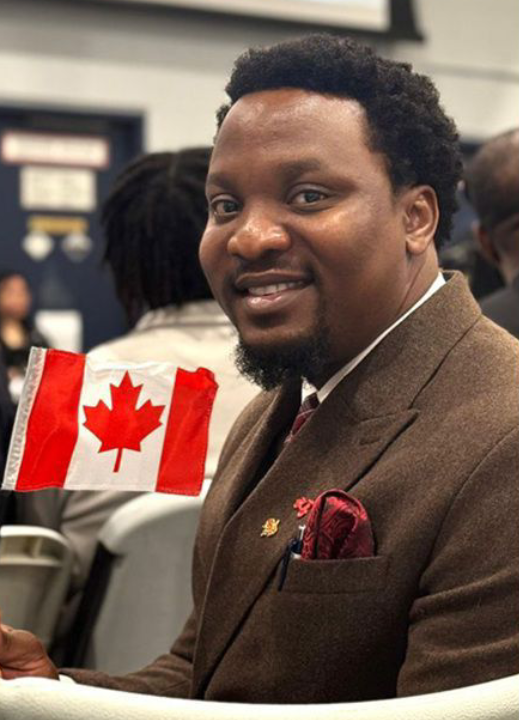
“Is Nigeria Really That Unlivable?”: A Heated Debate Sparks Over Nigerians Celebrating Western Citizenship

A seemingly simple social media post has ignited a storm of debate across Twitter and other platforms, questioning the state of living conditions in Nigeria and the mindset of Nigerians in diaspora. The conversation began when Daddy Eni, a Nigerian who recently acquired Canadian citizenship, shared his excitement online in a post that resonated with thousands: “I dreamt it, prayed for it, worked towards it when I didn't even know how I'd get there. But here I am today, living it, and it feels so normal. #CertifiedCanadian.”
The post, meant to celebrate a personal milestone, quickly attracted attention, but not all of it was congratulatory. Scott, a U.S.-based economist with a keen eye on African migration trends, responded with a pointed observation that has sparked widespread debate: “No group celebrates Western citizenship like Nigerians. They make a spectacle of it and you'd think escaping home is the dream. Is Nigeria really that unlivable?”
The question is provocative, but it touches on a broader discussion about migration, economic opportunity, and societal challenges in Nigeria. For decades, Nigerians have sought to live abroad in countries like Canada, the United States, and the United Kingdom. The reasons are multi-faceted: many cite security concerns, economic instability, limited access to quality education and healthcare, and the allure of better professional opportunities abroad. But the question Scott raises goes beyond logistics—it challenges a cultural phenomenon, the performative joy of becoming a citizen of another country.
For many Nigerians, achieving Western citizenship is not just a legal milestone; it is a symbol of achievement, security, and escape from the everyday struggles that have become synonymous with life in Nigeria. Social media amplifies this celebration, as posts of arrival ceremonies, photos with new passports, and declarations of “finally home” flood timelines. To those observing from abroad or within Nigeria, it can appear excessive or even tragic, a public testament to the challenges many feel they cannot overcome at home.
Critics argue that this celebration reflects poorly on Nigeria itself, as if the country is being abandoned in favor of greener pastures. Supporters, however, counter that it is a natural human desire to seek better opportunities and that expressing joy in achieving a hard-won goal does not equate to disparaging one’s home country. For many, social media is a stage where life milestones are broadcast, celebrated, and documented, and citizenship is no different.
The debate also taps into a long-standing narrative about the “brain drain” phenomenon. Nigeria, despite being Africa’s largest economy and one of the continent’s most populous nations, has struggled with the emigration of skilled professionals. Doctors, engineers, educators, and tech experts often leave the country, seeking stability and opportunity in nations with more predictable systems and infrastructure. The public celebration of these successes abroad can serve as both inspiration and indictment, highlighting both individual triumph and systemic failure.
On the flip side, some social commentators urge nuance. Nigeria is far from unlivable; it remains a nation rich in culture, natural resources, and entrepreneurial energy. Millions of Nigerians thrive domestically, building businesses, shaping industries, and creating meaningful lives without leaving their homeland. The social media spectacle of citizenship, they argue, is not a condemnation of Nigeria but a reflection of global aspiration and the universality of migration dreams.
Scott’s comment has also prompted deeper questions about identity, loyalty, and societal expectation. Is the joy of receiving citizenship a rejection of one’s roots, or is it simply a personal victory in a world that increasingly values mobility and global opportunity? For Nigerians, many of whom face daily challenges from inconsistent electricity and water supply to rising insecurity and inflation, the dream of living in a country where basic services are reliable and predictable is not merely aspirational—it is deeply practical.
The conversation touches on an emotional chord, highlighting generational perspectives. Older Nigerians may view mass celebration of Western citizenship as a troubling sign, an implicit statement that the nation has failed its youth. Younger Nigerians, meanwhile, may see it as an aspirational benchmark, a validation of hard work, resilience, and perseverance. Social media accelerates this generational tension, turning private pride into public discourse, often accompanied by memes, debates, and viral reactions.
Some analysts have noted that the phenomenon is not unique to Nigeria, but the scale and visibility in Nigerian social media culture are remarkable. Unlike other countries where citizenship may be quietly acknowledged, Nigerians are known for their exuberant, sometimes theatrical celebration. This cultural factor has become a point of fascination and criticism, prompting outsiders to question the quality of life in Nigeria.
Yet, framing Nigeria as “unlivable” ignores the complexity of its reality. Nigeria is a nation of contrasts, where immense wealth and opportunity exist alongside hardship and uncertainty. It is home to world-class talent, vibrant cities, and a booming creative and tech sector, alongside persistent issues of governance, infrastructure, and social inequality. To call it unlivable is to simplify a nuanced, layered reality.
Social media, however, thrives on simplification and spectacle. A single tweet, photo, or video can provoke national debate and shape perceptions in ways that traditional discourse cannot. Daddy Eni’s post, and the reaction it received, illustrates this dynamic perfectly: a moment of personal celebration becomes a catalyst for national introspection, discussion, and controversy.
Ultimately, Scott’s provocative question—“Is Nigeria really that unlivable?”—forces Nigerians to confront the realities of migration, opportunity, and national pride. It challenges citizens to examine what drives the collective yearning to leave, and whether those desires reflect personal ambition, systemic failure, or a combination of both. More importantly, it opens a space for dialogue about what can be done to make life in Nigeria not just livable, but truly aspirational, for those who choose to stay.
While the debate rages online, one thing is clear: the conversation around citizenship, migration, and national pride is far from settled. Each post, each tweet, each celebration abroad carries layers of meaning—hope, pride, frustration, and ambition—all intertwined in the complex tapestry of Nigerian life. Whether Nigeria is unlivable or not may ultimately depend less on external judgment and more on the internal choices, resilience, and collective vision of its people.
In the end, the debate sparked by a simple declaration of “#CertifiedCanadian” is a mirror reflecting the aspirations, frustrations, and dreams of millions of Nigerians. It asks uncomfortable questions, challenges assumptions, and forces a nation to confront itself—not just as a country struggling with systemic issues, but as a vibrant, complex society filled with people whose dreams sometimes take them far from home. And perhaps that, in itself, is the point: celebrating success abroad does not erase love for home; it merely underscores the universal human desire for stability, opportunity, and dignity.


